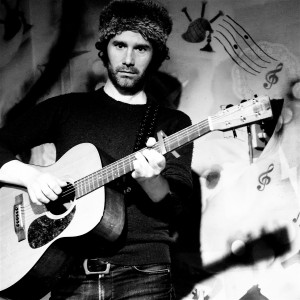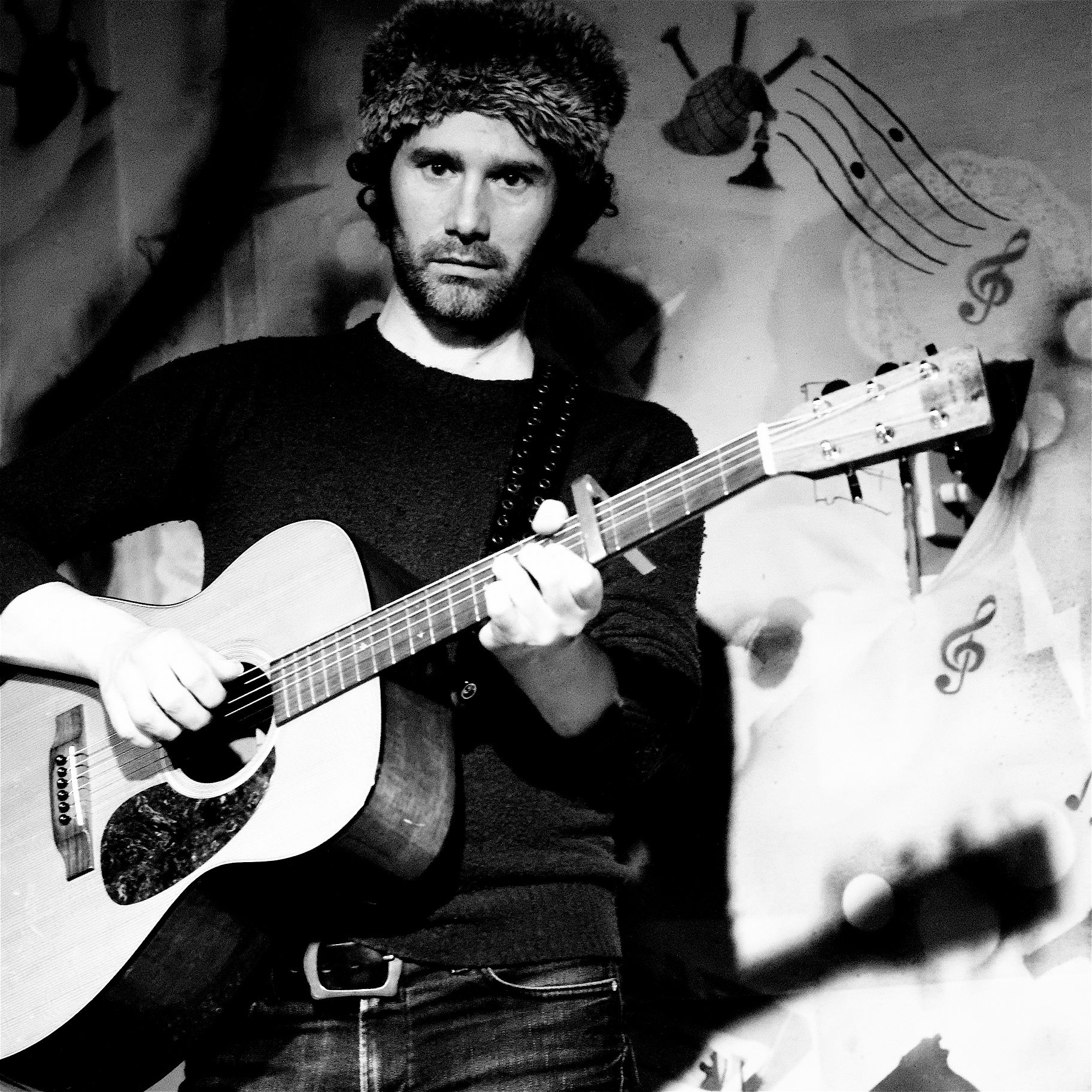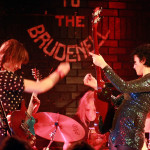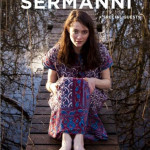 Patrick Duff certainly knows how to make an entrance.
Patrick Duff certainly knows how to make an entrance.
However, anyone familiar with the former Strangelove frontman’s spikey-haired, flamboyant-flared trousered theatrics might be slightly taken aback. Armed with a rudimentary acoustic guitar, splendidly resplendent in furry hat and bomber jacket, Duff stares into the assembled Slaughtered Lamb crowd with the authoritative air of an experienced secondary school teacher waiting for silence from an unruly mob of Year 11s. Yet unlike the (stereotypical) modern-day teenager, the London audience are captivated, silent, expectant.
And so begins one of the strangest, curious, intriguing and remarkable gigs of the year to date. If it’s possible to be struck by the sound of silence then this was the moment. There’s no bombastic introduction, no verbose and unnecessary guitar ramblings nor explosive taster of things to come. Instead, the haunting simplicity and beauty of Duff’s guitar picking warms the body and the heart of a cold, winter’s evening in the depths of a Clerkenwell basement.
When Patrick Duff sings everything about the music makes sense. His voice has the clarity of singers past – (rather than employing the current vogue for nasal whining) and soon the intimate walls of the Slaughtered Lamb are reverberating with tonality and timbre of Patrick’s pure, well-defined delivery.
There’s no reliance on pyrotechnics or foot-on-the-monitor rock-star posturing … the slight move Duff employs involve rocking backwards and forth with a fixed, steely stare into the eyes, souls and minds of the gathered watchers and listeners. And watch and listen we do, to each progressive chord pattern and story-time lyric.
Occasionally the slender, Brit-Pop survivor breaks into a line of personable chat, with snappy quips and slightly acerbic anecdotes – (a mordant Al Stewart with swearing if you will). Falling onto his mixed Irish / Welsh heritage, with a touch of Bristolian charm, Duff sings songs connected to real-life experiences and old-world legacy, with the theme of ‘family’ embedded in the narrative.
A thoroughly honest set of songs are the basis for the first of a two-part set; Duff admitting his inability to write a song in his twenties that he felt he needed to (or wanted to), but following it up with the perfect tale and recognition of ‘fuck-ups’ that he finally managed to complete in his thirties.
To close the opening set Duff reverted to storyteller mode; there followed a bizarre, yet truthful, account of Millennium Eve when, by his own recollection, aeroplanes were supposed to fall out of the sky, computers were all crash and broke, ex-Brit-Pop singers sat around in rented flats owned by those of a religious persuasion admittedly “not doing very much.’
Where Patrick leads us next is unusual, to say the least. He’s invited to Salisbury Cathedral and, with his New Year’s Eve invitation pile standing at zero, he dutifully accepts. At a pre-function drinks and chit-chat, despite being dressed in platform shoes and smothered in white face make-up, the singer finds himself not only making a new best friend and soul mate in the Bishop of Salisbury but entering into a fractious contretemps with ex Tory Prime Minister, sailor and band-leader Edward Heath, who our erstwhile hero of the tale finds surreptitiously stealing as many cocktail sausages as he can lay his naughty, nautical hands on.
As raconteur, Duff has a languid, easy style – unhurried yet never seemingly strolling down ceaseless, long and winding paths. How the singer ends up triumphant over Edward Heath needs hearing in the flesh, as Patrick’s eyes light up in exultant celebration and he leads into his final song of the first set.
Here he falters at the intro – a tad unsure – has Heath garnered revenge from his stony tomb deep in Salisbury Cathedral (or has Duff merely forgotten the tune?) There’s a re-gathering of his thoughts and his nimble fingers re-live the opening arpeggios and a gorgeous melody once again radiates into the room. Again a pause, a dropped lyric, a stagger then a fall as Duff struggles for the missing pieces to his composition.
But it’s okay – nothing matters – the basement crowd of the Slaughtered Lamb are with him, all the way.
The second set, Duff promises, gives him the freedom to try something a little different. Ethereal balladry mixes with more orthodox song structures while Duff battles his effects pedals for atmosphere, building the ambience with subtle guitar strokes, agile fretwork and finally deliberate, belligerent chord hammering.
It’s an altogether more disconcerting set but nonetheless effective and mesmerizing for its seemingly amorphous identity. What anchors Duff’s performance is his ability to keep every eye (and ear) of the Saturday night crowd on his every nuance, every whispered lyric, every heart-felt top note delivered effortlessly.
Even the (usually dreaded) audience participation sing-a-long was delivered with humour and returned in good grace (and voice) by the assembled crowd, led in no small measures by Desperate Journalist’s bass player Simon Drowner “No, no no!” pleaded Duff, answered by the audience before a satisfying “yeah!” fulfils his, and our, wishes.
A cover of The Doors’ ‘The End’ isn’t actually the end – it’s a raucous, unplugged version of Bowie’s ‘Space Oddity’ – Duff stepping out from beyond the mic and writhing around on the carpeted floor, mouthing Mick Wayne’s guitar solo and looking as if he’s having (and has just had) the time of his life.
Surviving the 90s is an achievement in itself – re-grouping and re-emerging as a true talent in singer-songwriting has brought personal contentment, obvious in Duff’s face and in his eyes. The ghost of Brit-Pop probably lies buried side by side with ex Tory Prime Ministers. May they rest in peace.




